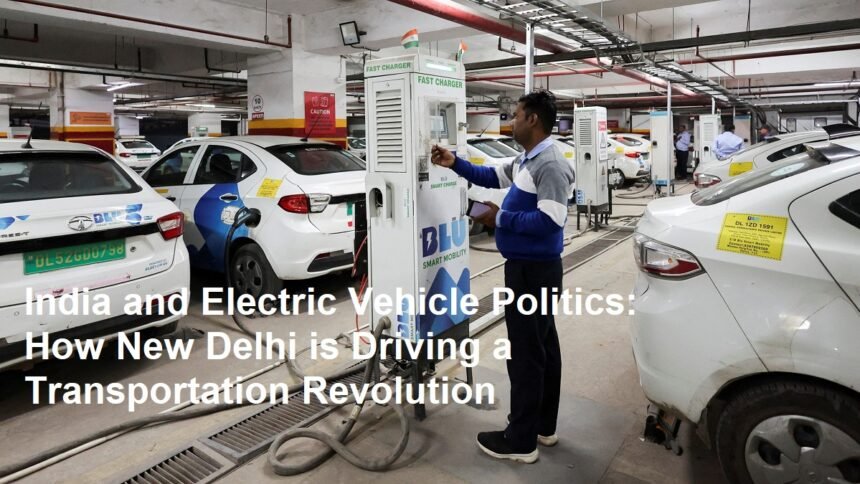Introduction: Why India’s EV Politics Matter
India is one of the fastest-growing economies in the world, and its streets are packed with motorcycles, rickshaws, buses, and cars. With rising pollution and oil imports draining the economy, the country has set its eyes on a new frontier: electric vehicles (EVs).
The story of politics of electric vehicles in India isn’t just about shiny new cars. It’s about how government policy, subsidies, and industry pressure are reshaping the Asian automotive market. If you’re curious about EV policies in India, or wondering what incentives exist for buyers, this article breaks it down for you—complete with practical takeaways.
The Core of India’s EV Strategy
The Rise of EV Politics in India
New Delhi has framed EV adoption as both an environmental and economic necessity. India imports over 80% of its crude oil, which makes the country vulnerable to global price shocks. EVs, powered by cleaner and locally produced electricity, are seen as a long-term solution.
Key Policies Supporting EVs
- FAME (Faster Adoption and Manufacturing of Hybrid & Electric Vehicles): A central scheme offering purchase incentives, charging infrastructure support, and subsidies for public transport electrification.
- State-level initiatives: Many Indian states—like Delhi, Maharashtra, and Tamil Nadu—provide extra subsidies, road tax waivers, or free registration for EVs.
- Local manufacturing push: Policies encourage battery production and EV assembly in India to reduce reliance on imports.
💡 Tip for readers: If you’re an EV buyer in India, always check both central and state-level policies—you may be eligible for double incentives.
Green Transport Subsidies: How They Affect Consumers
The government isn’t just focusing on automakers. Subsidies for green transportation are designed to make EVs affordable for everyday consumers.
What This Means for Buyers
- Lower upfront costs: FAME-II provides up to ₹15,000 per kWh of battery capacity for electric two-wheelers, which dominate the Indian market.
- Cheaper financing: Many banks now offer special EV loans with lower interest rates.
- Operational savings: EVs cost significantly less to run compared to petrol or diesel vehicles.
💡 Tip for readers: Before buying, calculate your total cost of ownership (TCO). In India, an EV often becomes cheaper than a petrol vehicle after just 3–4 years.
The Role of Asian Automotive Market in India’s Push
India isn’t working in isolation. The Asian automotive market is deeply connected, with China, Japan, and South Korea playing key roles.
Regional Influences
- China’s dominance: Most affordable EV batteries still come from China, making supply chain politics critical.
- Japan and Korea: These nations are investing in joint ventures for EV technology and charging infrastructure in India.
- India’s ambition: By positioning itself as an EV manufacturing hub, India hopes to compete with regional giants.
💡 Tip for readers: If you’re an investor, look at Indian auto companies forming partnerships with Asian battery makers—these alliances are shaping the EV future.
Challenges Facing India’s EV Revolution
While the policies look promising, the road isn’t without bumps.
Key Obstacles
- Charging infrastructure: Many regions still lack fast-charging stations.
- High battery costs: Even with subsidies, EVs remain expensive for rural and low-income buyers.
- Policy consistency: Frequent changes in subsidy amounts sometimes confuse consumers and automakers.
💡 Tip for readers: If you’re worried about charging, consider EVs with removable batteries or plug-in hybrids as a transitional choice.
Political Willpower: The Driving Force
The politics of electric vehicles in India goes beyond economics. It’s also about building global influence. By pushing EV adoption, India wants to:
- Reduce urban air pollution (a major voter concern).
- Decrease oil dependency and strengthen energy security.
- Showcase leadership in climate negotiations.
💡 Tip for readers: If you’re following Indian politics, keep an eye on EV policy announcements before elections. They often reflect the government’s priorities and can indicate future market growth.
What This Means for Everyday Indians
The average Indian consumer may not think about international trade wars or political debates. But these policies directly affect daily life:
- Cleaner air: More EVs mean fewer emissions in cities like Delhi and Mumbai.
- Affordable mobility: Subsidies make EV scooters and rickshaws more accessible to students, delivery workers, and families.
- Job creation: EV manufacturing and battery plants are opening new career opportunities across India.
💡 Tip for readers: If you’re planning a career shift, consider EV-related industries—demand for skilled workers is growing rapidly.
The Road Ahead: Can India Lead the EV Revolution?
India has the potential to become a major EV hub, but only if it balances politics, consumer needs, and industry growth.
Possible Futures
- Optimistic scenario: Stable policies, strong manufacturing, and better infrastructure make India a global EV leader.
- Cautious scenario: Growth remains limited to cities, with rural areas lagging due to cost and infrastructure barriers.
- Competitive scenario: India becomes a battleground for Chinese, Japanese, and Korean automakers.
💡 Tip for readers: If you’re a business owner, consider investing in EV charging stations—demand is expected to skyrocket.
Conclusion: India’s EV Politics in Action
The politics of electric vehicles in India is shaping how people move, how industries grow, and how the country positions itself in the global market. With EV policies in India evolving, green transport subsidies expanding, and the Asian automotive market influencing the pace, New Delhi’s push for electrification is more than just a trend—it’s a revolution.
The real question now: how fast can India overcome its challenges and make EVs mainstream for all?
What do you think about India’s EV policies? Do you believe subsidies and government push are enough to make EVs accessible to everyone, or is the infrastructure gap too big? Share your thoughts in the comments—I’d love to hear your perspective!












